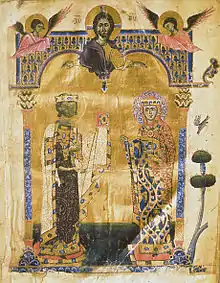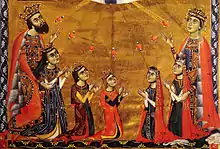Keran, Queen of Armenia
Keran of Lampron (before 1262 – 28 July 1285) was a by-birth member of the House of Lampron and by marriage Queen consort of Armenia.
| Keran of Lampron | |
|---|---|
 Portrait of King Leo II and Queen Keran of Armenia by Toros Roslin, 1262. | |
| Queen consort of Armenia | |
| Tenure | 1269 - 1285 |
| Died | 28 July 1285 |
| Spouse | Leo II, King of Armenia |
| Issue …among others | Hethum II Thoros III Sempad Isabella, Princess of Tyre Constantine I Rita, Byzantine Empress Oshin |
| House | Lambron |
| Father | Prince Hethum of Lampron |
| Mother | Unknown |
She was the daughter of Prince Hethum of Lampron by his unknown wife, who probably was from Frankish origin.[1] She had three known siblings: Marianne, Alix (later wife of Balian d'Ibelin, Seneschal of Cyprus), and Raymond, Lord of Michael'gla.
Life
Before 15 January 1262/14 January 1263, Keran married Prince Leo of Armenia, eldest son and heir of King Hethum I, who became King after his father's abdication in 1270. Born Anna, she was called Kir-Anna (Lady Anna) after her husband took the throne. This name was later shortened to Keran, or Guerane.
Many words of praise were made about Queen Keran by her contemporaries. Her son Hethum claimed that "she had a wonderful soul and a beautiful body." The chronicler and scribe Avetis, described her as "a good friend to her husband in trouble and joy."
After the birth of her last son, Keran became a nun and entered the Monastery of Trazarg, assuming the name of Theophania. She was probably joined there by her sister Marianne. She died on 28 July 1285 and was buried in the Monastery.
Issue
Queen Keran bore her husband Levon (Leo) II, King of Armenia sixteen children:

- Son (b. 15 January 1262/14 January 1263 – d. young).
- Constantine (b. June 1265 – d. young).
- Fimi [Euphemia] (b. ca. 14 January 1266 – d. young).
- Hethum II (b. ca. 13 January 1267 – murdered 7 November 1307), King of Armenia (ruled 1289 to 1293, 1294 to 1297, 1299 to 1307).
- Isabella [Zabel] (b. 13 January 1269/12 January 1270 – d. bef. 1273).
- Thoros III (b. October 1270 – murdered 23 July 1298), King of Armenia (ruled 1293 to 1298).
- Ruben (b. 13 January 1272/12 January 1273 – d. young)
- Isabella [Zabel] (b. 12 January 1273/11 January 1274 – d. bef. 1276).
- Sempad (b. 12 January 1276/11 January 1277 – d. 1310 or 1311), King of Armenia (ruled 1297 to 1299).
- Isabella [Zabel] (b. 12 January 1276/11 January 1277 – murdered May 1323), twin with Sempad; married in 1293 with Amalric of Lusignan, Prince of Tyre, son of King Hugh III of Cyprus.
- Constantine I (b. 11 January 1277/10 January 1278 – d. aft. 1308), King of Armenia (ruled 1299).
- Rita (b. 11 January 1278/10 January 1279 – July 1333), renamed Maria upon her wedding; married in 1294 with Michael IX Palaeologus, co-Emperor of the Byzantine Empire with his father Andronicus II Palaeologus.
- Theophanu (b. 11 January 1278/10 January 1279 – d. 1296), twin with Rita; renamed Teodora upon her betrothal; she died en route to be married with Theodore, son of John I Doukas, Lord of Thessaly.
- Nerses (b. 11 January 1279/10 Jan 1280 – d. 26 May 1301), a priest.
- Oshin (b. 10 January 1283/9 January 1284 – murdered 20 July 1320), King of Armenia (ruled 1308 to 1320).
- Alinakh (b. 10 January 1283/9 January 1284 – d. 28 August 1310), twin with Oshin; Lord of Lampron and Tarsus.
Notes
- W. H. Rüdt-Collenberg: The Rupenides, Hethumides and Lusignans, The Structure of the Armeno-Cilician Dynasties, Paris, Librairie Klincksieck, 1963, p. 61. speculates that the names of her children indicate her origins, and suggests that she may have been Marie of Antioch, daughter of Bohemond IV, Prince of Antioch, although according to the Lignages d'Outremer she married Thoros, by whom she had one son Buemont (Lignages d'Outremer, Marciana Ms Francese 20, CC.XCII, p. 67.)
Bibliography
- Khachatrian, Hayk (2001). Queens of the Armenians: 150 Biographies Based on History and Legend. Yerevan: Amaras. ISBN 0-9648787-2-0.